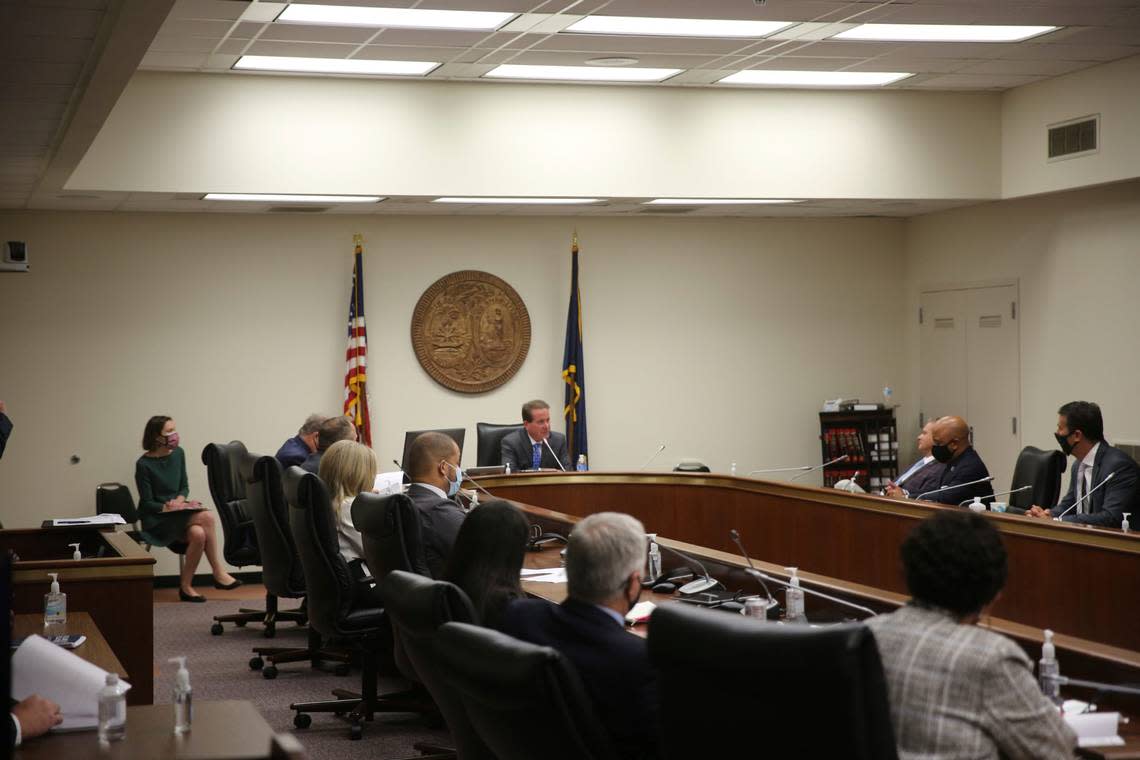Wife of powerful House judiciary chairman files to run for open SC Supreme Court seat
The wife of House Judiciary Chairman Chris Murphy has filed to run for a seat on the S.C. Supreme Court, an election vetted by legislators and voted on by the 170-member General Assembly.
Maite Murphy, an at-large state judge and the wife of Dorchester Republican Rep. Chris Murphy, is one of five state judges gunning for a job at the pinnacle of South Carolina’s legal galaxy — to be a justice on the state Supreme Court.
Chris Murphy is the powerful chairman of the House Judiciary Committee, through which many bills pass every year. His brother Michael Murphy III is a Dorchester County family court judge.
The five current state judges — who include Maite Murphy — are running for a vacancy on the state Supreme Court that will open up early next year when Associate Justice Kaye Hearn retires, according to a list of upcoming judicial elections from the Judicial Merit Selection Commission.
Hearn was due to retire July 31 this year because she turns 72, the court’s official retirement age. But, last year, she ran unopposed and won a new 10-year term as a justice though she must leave office Dec. 31.
Besides Maite Murphy, Court of Appeals judges David Garrison “Gary” Hill and Aphrodite Konduros, both of Greenville County, and Stephanie Pendarvis McDonald of Charleston, are running. Also running is Administrative Law Judge Ralph K. Anderson III, of Columbia.
Ordinarily, most Supreme Court justices have served on the nine-judge Court of Appeals, which is the state’s second-highest court. Of the five current Supreme Court justices, four previously served on the Court of Appeals.
It’s rare — but not unheard of — for a state judge such as Maite Murphy to be elevated directly to the Supreme Court.
Nor is it unheard of that a legislator’s family member runs for a judicial opening, voted on by the Legislature.
Few lawyers and legislators were willing to be quoted by name about the upcoming Supreme Court race, expressing caution about saying something that might offend a judge or justice in any future case of theirs.
However, one lawyer familiar with the judge selection process who requested anonymity to speak freely about the process said that since the 170 South Carolina lawmakers elect state judges, an influential lawmaker such as Chris Murphy has a decided advantage in rounding up votes for a family member.
“If a member asks you to do something for their family, and you don’t do it, they never forgive you,” the lawyer said. “And if a member is someone like the chairman of the Judiciary Committee, it is hard to vote against their wife.”
Chris Murphy, Maite Murphy and Michael Murphy could not be reached for comment by press deadline.
“Would that be too much judicial power concentrated in the hands of one South Carolina family? I don’t know, but it’s a good question,” said John Crangle, a Columbia lawyer who has written and commented for years on ethical issues in state government.
Another dynamic in the Supreme Court race is that many lawmakers and lawyers question whether Hearn, one of only two women ever to serve on the Supreme Court, should be replaced by a man or whether a woman should continue to hold that spot.
“At the least, the optics may look bad if there is a woman on the court now and she is not replaced with a woman,” said a state judge who requested anonymity to speak freely because judges traditionally don’t make public comments on judicial races.

How SC elects judges
South Carolina is one of two states where the legislatures elect state judges.
Supporters of the system say that the current system keeps politics out of the competition and assures that lawmakers get to know candidates and their records. Critics counter the system encourages nepotism and gives jobs to insiders who are close to lawmakers or their relatives.
The system works this way.
Anyone who wants to be a judge can submit their names and resume to a screening commission made up of three state senators, three state representatives and four citizens. The commission encourages comment from the community and other lawyers, and the commission interviews each candidate in public.
The commission then selects up to three candidates for a particular judge’s position to forward to the General Assembly.
Several weeks before the election, those selected candidates and their supporters can lobby lawmakers, rounding up pledges. Often, one candidate rounds up enough pledges to force the other candidates to drop out. Sometimes, however, no one candidate can get enough pledges and the entire General Assembly in a joint session will vote on the candidates.
Public hearings on the five current Supreme Court candidates, including Maite Murphy, are due to start Nov. 14.
Candidates may make an initial statement and then take questions from commissioners.
“The hearing will be a good place to ask the question, is this too much judicial power clustered in one family?” Crangle said.
Reporter Joseph Bustos contributed to this report.
